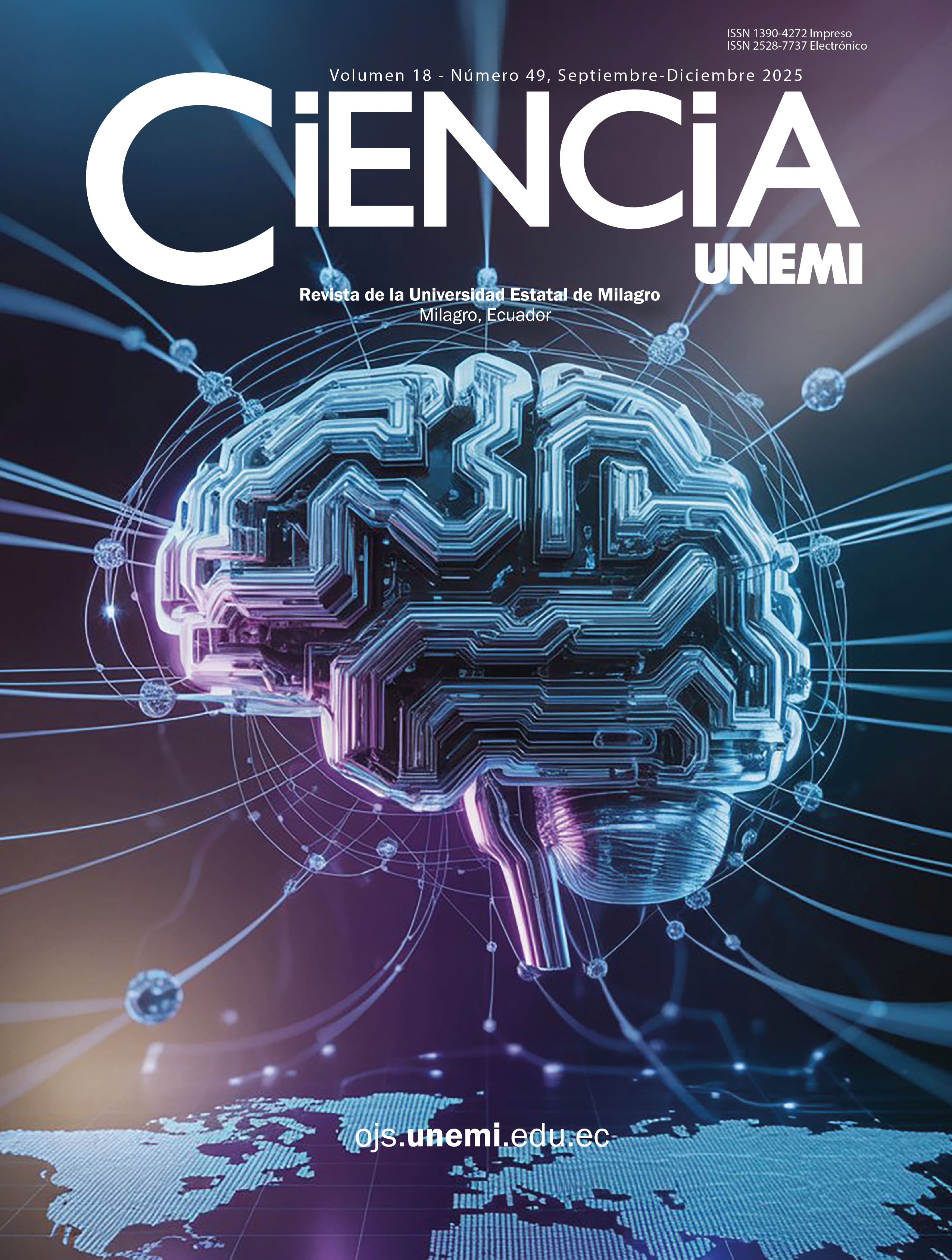Evaluación del comportamiento proambiental en estudiantes universitarios de Ecuador: Análisis con técnicas de Machine Learning
DOI:
https://doi.org/10.29076/issn.2528-7737vol18iss49.2025pp12-26pPalavras-chave:
Educación ambiental, actitudes ambientales, modelos predictivos, análisis de datosResumo
El comportamiento proambiental, esencial para la sostenibilidad, es influido por la educación ambiental, especialmente en contextos biodiversos como Ecuador. Las universidades desempeñan un papel crucial en la formación de actitudes y prácticas responsables frente a desafíos ambientales. Este estudio cuantitativo empleó encuestas estructuradas y técnicas de machine learning para clasificar y analizar el comportamiento proambiental de 365 estudiantes universitarios en Ecuador. Se usaron algoritmos como Bosque aleatorio y K-Means para clasificaciones y agrupamientos. Los modelos predictivos lograron una precisión promedio del 89%. Se identificaron tres perfiles de comportamiento: compromiso bajo, medio y alto. Las creencias ambientales y el conocimiento sobre biodiversidad mostraron correlaciones significativas con prácticas sostenibles. Los hallazgos resaltan la efectividad de la educación ambiental en la promoción de comportamientos sostenibles y la importancia de estrategias personalizadas según los perfiles estudiantiles. Se recomienda integrar estos hallazgos en programas académicos para fortalecer el compromiso ambiental en jóvenes
Downloads
Referências
Alessandri, S. (2019). A learning pathway to an integrated approach involving natural, applied and social science, humanities and arts to face climate change. Sustainability, 12, 199–214. https://doi.org/10.1089/sus.2018.0040
Álvarez, D., & Cadenas, R. (2022). Podcasts como herramienta para la educación ambiental en Ecuador. Revista de Ciencias Sociales, XXVIII, 189–203. https://doi.org/10.31876/rcs.v28i3.38468
Araujo-Vizuete, G., Robalino-López, A., & Murillo-Ojeda, R. (2022). Evaluation of environmental competencies in Higher Education Institutions (HEI). Case study: Escuela Politécnica Nacional, Ecuador. DYNA, 89, 132–139. https://doi.org/10.15446/dyna.v89n224.103515
Chipantiza-Masabanda, J. G., Bonilla-Bonilla, A. E., & Jativa-Reyes, M. F. (2021). Huertos urbanos y periurbanos horizontales-verticales para el fomento de la educación ambiental sostenible. Formación universitaria, 14, 165–172. https://doi.org/10.4067/S0718-50062021000200165
Del Moral Pérez, M. E., López-Bouzas, N., Castañeda Fernández, J., & Bellver Moreno, M. C. (2023). Impacto proambiental en jóvenes universitarios: Emociones generadas e implicación promovida por un storytelling de la ONU. Doxa Comunicación. Revista Interdisciplinar de Estudios de Comunicación y Ciencias Sociales, 193–212. https://doi.org/10.31921/doxacom.n37a1864
Díaz, M. F., Charry, A., Sellitti, S., Ruzzante, M., Enciso, K., & Burkart, S. (2020). Psychological factors influencing pro-environmental behavior in developing countries: Evidence from Colombian and Nicaraguan students. Frontiers in Psychology, 11, 580730. https://doi.org/10.3389/fpsyg.2020.580730
Douglas, F., Beasy, K., Sollis, K., & Flies, E. J. (2024). Online, experiential sustainability education can improve students’ self-reported environmental attitudes, behaviours and wellbeing. Sustainability, 16, 2258. https://doi.org/10.3390/su16062258
Estrada-Araoz, E. G., Manrique-Jaramillo, Y. V., Díaz-Pereira, V. H., Rucoba-Frisancho, J. M., & Gallegos-Ramos, N. A. (2024). Exploring pro-environmental behavior in Peruvian basic education students: A cross-sectional study. Salud, Ciencia y Tecnología - Serie de Conferencias, 3, 678. https://doi.org/10.56294/sctconf2024678
Falconí, F., Reinoso, M. E., Collado-Ruano, J., Hidalgo, E. F., & León, G. D. (2019). Environmental education program in Ecuador: Theory, practice, and public policies to face global change in the Anthropocene. Ensaio: Avaliação e Políticas Públicas Em Educação, 27, 859–880. https://doi.org/10.1590/s0104-40362019002701950
Geiger, S. M., Otto, S., & Diaz-Marin, J. S. (2014). A diagnostic Environmental Knowledge Scale for Latin America / Escala diagnóstica de conocimientos ambientales para Latinoamérica. Psyecology, 5, 1–36. https://doi.org/10.1080/21711976.2014.881664
Harkort, L., & Duan, Z. (2023). Estimation of dissolved organic carbon from inland waters at a large scale using satellite data and machine learning methods. Water Research, 229, 119478. https://doi.org/10.1016/j.watres.2022.119478
Hernández Sampieri, R., & Mendoza Torres, C. P. (2018). Metodología de la investigación: Las rutas cuantitativa, cualitativa y mixta (First edition). McGraw-Hill Education.
Loor, I. W., & Muentes, W. A. (2024). Cultivating spatial citizenship through collaborative mapping: An empirical study on youth engagement in peripheral urban Ecuador. Cogent Education, 11, 2359337. https://doi.org/10.1080/2331186X.2024.2359337
Markle, G. L. (2013). Pro-environmental behavior: Does it matter how it’s measured? Development and validation of the Pro-Environmental Behavior Scale (PEBS). Human Ecology, 41, 905–914. https://doi.org/10.1007/s10745-013-9614-8
Marouli, C., & Duroy, Q. (2019). Reflections on the transformative power of environmental education in contemporary societies: Experience from two college courses in Greece and the USA. Sustainability, 11, 6465. https://doi.org/10.3390/su11226465
Morote Seguido, Á. F. (2023). ¿De dónde está recibiendo la información sobre el cambio climático el alumnado escolar? Una aproximación desde las Ciencias Sociales. Revista Complutense de Educación, 34(2), Article 2. https://doi.org/10.5209/rced.79304
Naz, F., Oláh, J., Vasile, D., & Magda, R. (2020). Green purchase behavior of university students in Hungary: An empirical study. Sustainability, 12, 10077. https://doi.org/10.3390/su122310077
Ortiz-Regalado, O., Llamo-Burga, M., Carrión-Bósquez, N., Chávez-Gutiérrez, H., Guerra-Regalado, W., Veas-González, I., Ruiz-García, W., & Vidal-Silva, C. (2024). Unveiling millennials’ perceptions of organic products: A grounded theory analysis in Ecuador and Peru. Sustainability, 16, 5230. https://doi.org/10.3390/su16125230
Palacios Madero, M. D., Torío López, S., & Murga-Menoyo, M. Á. (2023). Conductas prosostenibilidad y percepciones del estudiantado adolescente sobre prácticas parentales y valores familiares. Interdisciplinaria. Revista de Psicología y Ciencias Afines, 40, 409–423. https://doi.org/10.16888/interd.2023.40.2.24
Posso Pacheco, R. J., Cóndor Chicaiza, M. G., Cóndor Chicaiza, J. D. R., & Núñez Sotomayor, L. F. X. (2022). Desarrollo Ambiental Sostenible: Un nuevo enfoque de educación física pospandemia en Ecuador. Revista Venezolana de Gerencia, 27, 464–478. https://doi.org/10.52080/rvgluz.27.98.6
Spellman, G., Field, K., & Sinclair, J. (2003). Assessing UK higher education students’ awareness of global climatic change. Weather, 58, 212–219. https://doi.org/10.1256/wea.62.02
Tchetchik, A., Kaplan, S., & Blass, V. (2021). Recycling and consumption reduction following the COVID-19 lockdown: The effect of threat and coping appraisal, past behavior and information. Resources, Conservation and Recycling, 167, 105370. https://doi.org/10.1016/j.resconrec.2020.105370
Zúñiga Sánchez, O., Marúm Espinosa, E., & Aceves Ávila, C. D. (2022). La educación para el desarrollo sustentable en la visión del profesorado de educación superior en México. Revista Interuniversitaria de Formación del Profesorado. Continuación de la antigua Revista de Escuelas Normales, 98. https://doi.org/10.47553/rifop.v98i36.2.91549
Downloads
Publicado
Edição
Seção
Licença
Copyright (c) 2025 CIENCIA UNEMI

Este trabalho está licenciado sob uma licença Creative Commons Attribution-NonCommercial-NoDerivatives 4.0 International License.
Los autores pueden mantener el copyright, concediendo a la revista el derecho de primera publicación. Alternativamente, los autores pueden transferir el copyright a la revista, la cual permitirá a los autores el uso no-comercial del trabajo, incluyendo el derecho a colocarlo en un archivo de acceso libre.

















